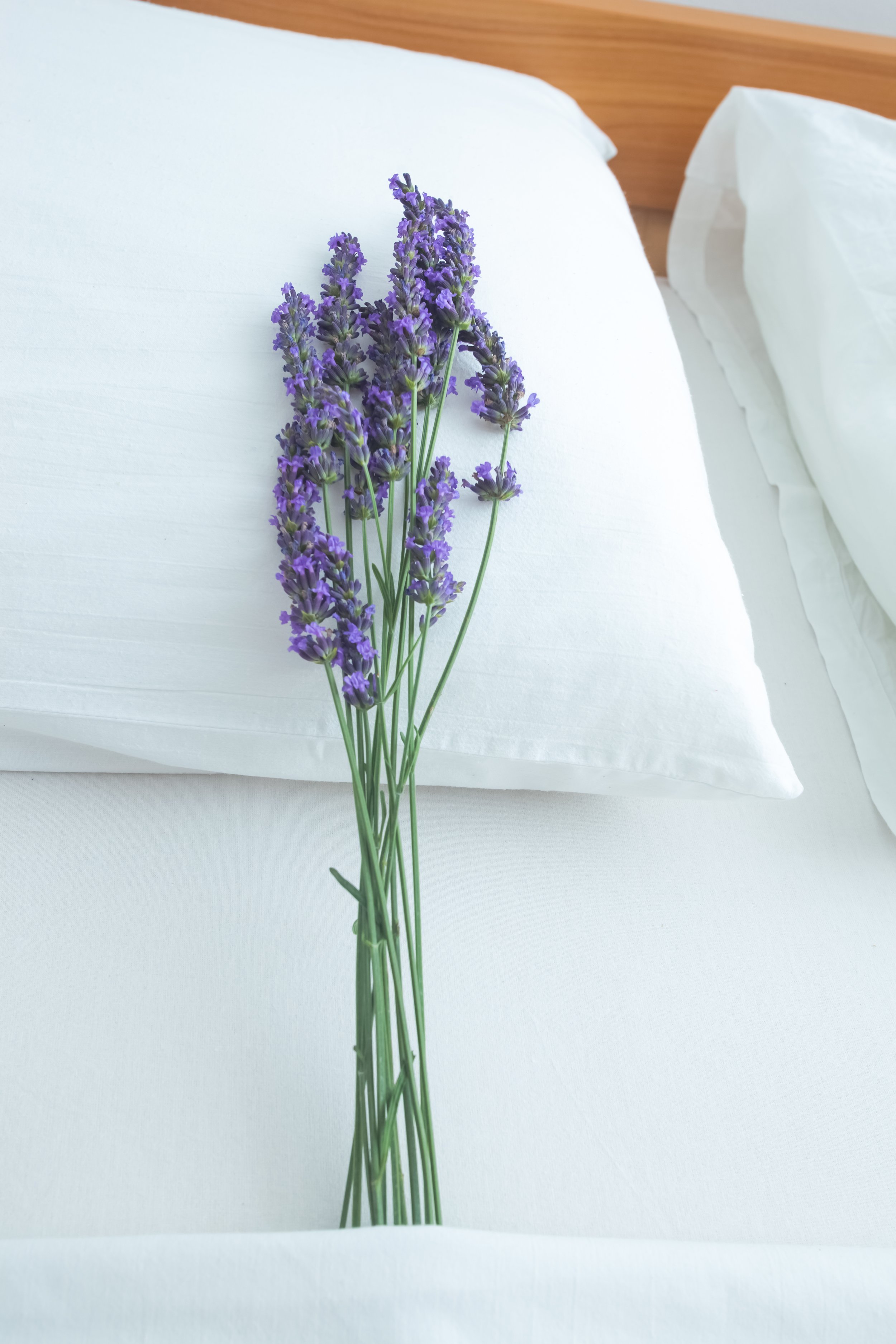Lavender and Sleep
Sleep is Key for your Wellbeing
Sleep is one of the most fundamental physical requirements for human survival, and increasing evidence shows its key role in restoring the human body. Sleep deprivation is unfortunately prevalent in our modern society and a lack of sleep is now known to contribute to a wide range of physical and mental health issues including impaired immunity, memory loss, obesity, increased risks of cardiovascular disorders and more.
Essential oils, and in particular lavender essential oils, have been used to improve sleep quality since Roman times. Today, an increasing range of studies are supporting the value of using natural aromatherapy therapies, particularly the use of lavender essential oils to alleviate symptoms of insomnia, improve sleep quality and duration.
About Sleep:
Our sleep goal is to enhance our “sleep architecture” which incorporates our ease of getting to sleep, staying asleep and having good quality sleep.
There are two main phases of sleep: dream sleep (rapid eye movement or REM) and non-dream sleep (non-REM). Throughout the night we cycle multiple times through these sleep phases.
Dream Sleep (REM) is characterized by an increase in metabolic activity in the brain. Your eyes move rapidly behind your closed eyes, your heart rate speeds up, and your breathing becomes irregular and it is when dreams occur.
During REM sleep, your brain processes new learnings and motor skills from the day and emotions, committing some to memory, maintaining others, and deciding which ones to delete. On average dream sleep comprises about 25-30% of an adult’s entire sleep duration and up to 50% for children.
Non-dream sleep (Non-REM) begins with a drowsy sleep phase, progressing to a 2nd stage where muscular activity lowers, and conscious awareness of the external environment disappears. This phase accounts for around half of adult sleep time and is also when the brain gathers, processes, and filters new memories you acquired the previous day. In the third and fourth stages, also known slow wave sleep, the brain waves slow down to a very slow and coordinated pattern. This deep sleep phase is a critical stage for regenerating your brain and body, strengthening the immune system.
Lavender & Sleep studies:
Lavender essential oil is well known to be a natural remedy to treat insomnia and improve sleep quality without the risk of unwanted sedative or other drug specific effects. Lavender essential oil has been shown to both promote the onset of sleep as well as improve sleep quality and sleep duration.
Various recent studies have examined the effect of lavender on the sleep cycle, and results to date are promising. For example, a 2016 study assessed the effects of lavender on students experiencing sleep trouble. The test ran over five nights found that lavender had a positive effect on sleep quality as well as daytime alertness.
A 2005 American study reported the effects of lavender on the sleep cycle of 31 young, healthy sleepers. Results showed that using lavender increased the sleep duration. The length of time to the first waking in the night was also increased.
A further study using lavender essential oil was noted to assist the sleep quality for elderly patients (less delays in falling asleep, longer sleep duration, fewer sleep disorders). Another study which bathed infants by adding a few drops of lavender essential oil to water found that it helped them to relax and sleep better.
Though most of the studies to date have been small (and more trials are needed), there’s enough consistency across a range of results to see that better sleep can be attained across a wide range of age groups by using lavender essential oils.
How You Can Use Lavender Essential Oil to Improve Your Sleep:
1. Apply directly: Dab a drop or two of lavender essential oil on your temples, behind your ears, on pulse points like the wrists and at the base of the throat, or on the back of your neck before bedtime.
2. Inhale the aroma: Deep sniffs of lavender essential oil direct out of the bottle or dab a little on the top lip right under your nose. Alternatively place a few drops on your hands, rub them together, cup your palms over your nose and inhale deeply.
3. Use a Diffuser: Use lavender essential oil in a cold diffuser in your bedroom approximately one hour before your bedtime.
4. Apply to your pillow: Add a few drops of Lavender Oil onto your pillow or cloth placed over your pillow.
5. In a warm bath: Add 8-10 drops of lavender essential oil to a warm bath.
In order to achieve an enhanced sleep from lavender essential oils it is important to check that you are only using a 100% pure undiluted lavender essential oil.
Note: Please check with your doctor before using essential oils to treat any medical concerns, particularly if you are treating a baby or a child. Please note lavender and other essential oils affect everyone differently and are concentrated so apply with caution to your skin and do not consume internally.


